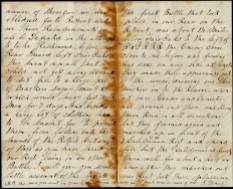This letter was written by George Scheetz (1840-1905), the son of John Scheetz (1818-1857) and Anna Catherine Sands (1815-1886) of Pottstown, Montgomery county, Pennsylvania.
George Scheetz enlisted on 21 April 1861 with Co. C, 4th Regiment Pennsylvania Volunteers. Upon the expiration of his term, he re-enlisted as a corporal with Co. A, 53rd Pennsylvania Volunteers. It was while serving with the 53rd Pennsylvania that George wrote this letter, just after the Peninsula Campaign while bivouacked at Harrison’s Landing on the James River.
Late in 1862, at the Battle at Fredericksburg, George was severely wounded and lay on the battlefield until being rescued at night. His wounds were severe enough to cause his discharge from the regiment on 10 March 1863 as a sergeant.
Prior to the battle at Gettysburg, George enlisted in the emergency regiment 26th Pennsylvania, serving as a 2d Sergeant. His regiment met in battle with General Ewell’s troops on June 26 and pushed back to Harrisburg. During all of this time, he was still suffering from his wound. Finally in the summer of 1864, he enlisted with the 197th Regiment—a 100-day unit—serving as 1st Sergeant.

TRANSCRIPTION
Harrison Point Landing, Va.
July 6, 1862
Dear Cousin,
I received your letter and was very much pleased for to hear from you that you are all well as I am the same. I expect when the news reached Pottstown that the army had fallen back from Fair Oaks, it caused quite an excitement but it is for our own good for it is thought that the Rebels have a much stronger force there than what our Head Commander was aware of. Therefore we were obliged for to retreat until we have reinforcements or else be defeated in the attempt to take Richmond. ¹ Before our rear guard left Fair Oaks, they burnt up all that we could not get along. We had to set fire to a large pile of crackers, sugar, meat, &c. which would have fed 75,000 men for 7 days. And [besides that], a large lot of clothing had to be burnt for to prevent them from falling into the wrong hands of the Rebels. ² But enough of this.
As you have heard of our regiment being in another battle, I will give you some little account of the fights. The first battle that took place in our rear on the retreat was about 1½ miles below Fair Oaks to the left of the Richmond and Yorktown Railroad. The enemy come close to us before any firing was done on any side. At length they made their appearance out of the woods, driving our skirmishers in to the reserve, when at once grape & canister was poured into them making them run in all directions. But they formed again and marched up in front of the 1st California Regt. [71st Pennsylvania] and opened fire. But the Californians fought them well for about a half an hour. After they marched out, our regiment took their place. We did not have much for to do for our Colonel J[ohn] R. Brooke commanded us not to fire until we were all ready for to give them a good volley.
At the word, “fire,” we opened and the effect of our Rifles made them skedaddle. But this wasn’t the only fight we were in for we had fighting to do for 3 days. In our retreat, the solid shot and shell came in and around us thick enough for awhile. I can not give you the correct or full account as I have no time but you can see it in the Pottstown paper by next week.
As in regard of sending a Rebel sword to your father, I will do [it] if I have any chance for to get hold of one. I seen plenty of rifles, swords, &c. of which the Rebs used against us but they were all stamped U. S. I want to get something of their own stamp. No more at present. I remain your cousin. Give my respects to all at home. Read this letter to my mother. — George Scheetz
N. B. The pen you sent in your letter comes in handy as I just was in need of one. — G. Scheetz
¹ The Fifty-third’s first major battle was at the Battle of Fair Oaks on June 1, 1862. Sent into the middle of the battle, the regiment was temporarily disorganized, but was still able to drive back the Confederates. Ninety-six men killed, wounded, and missing during the battle, including Major Yeager, who was killed.
² George is probably referring to the large quantity of stores stockpiled at Savage’s Station by McClellan’s supply line that were destroyed by Union troops as they retreated to keep it from falling into the Rebels hands.


